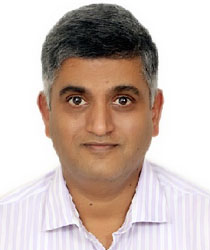
Dr. Anup Anvikar holds MD-Microbiology from Government Medical College, Aurangabad, Maharashtra. After a brief stint at Dr. Hedgewar Rugnalaya, Aurangabad, he was a Medical Teacher for 3 years. He joined the Indian Council for Medical Research, and worked for 5 years at ICMR-National Institute for Research in Tribal Health, Jabalpur and then for 14 years at ICMR-National Institute of Malaria Research (NIMR), New Delhi.
He was the Director at the National Institute of Biologicals (NIB) for two years.
Dr. Anvikar’s research focus has been on improving the diagnosis and treatment of infectious diseases including the development and quality assurance of diagnostics for malaria, chikungunya and dengue. He implemented the Quality Assurance programme for malaria Rapid Diagnostic Tests (RDT) in India. He rolled out clinical trials of antimalarials and several operational research studies on malaria control. He has been closely involved in the surveillance and monitoring of antimalarial drug resistance nationwide in India and has designed and led national pharmacovigilance studies of antimalarial medicines.
Dr. Anvikar established the only South-East Asian WHO-recognized malaria RDT lot testing laboratory at ICMR-NIMR, which is one of the three such facilities globally. He has vast experience as dossier assessor, Inspector for drugs, vaccines and diagnostics for various agencies.
While at NIB, he worked towards expanding the portfolio of life-saving biologicals tested for their Quality, strengthening the academic, research & training activities including the initiation of PhD programme and structured training programmes. He also worked towards ease of doing business by reducing the turnaround time, and testing fee to further promote the timely accessibility of quality biological products. During his tenure, NIB won the prestigious 1st Prof. S.K. Joshi Laboratory Excellence Gold Award in the field of Testing instituted by the Quality Council of India for outstanding achievements in the field of Quality services.
Dr. Anvikar has mentored national and international Masters students, PhD students and Post-Doctoral Fellows, and has published 160 papers in peer-reviewed journals. He has also managed several research projects with national and international funding. He has 10 patents to his name. He is also the recipient of two prestigious awards.